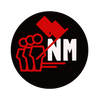When Trotskyists Organized Union Defense Guards to Stop Racist Terror
In 1975 trotskyist militants organized their union to provide defense guards for a black member facing racist attacks. An essential history of how working class power can be deployed against the racist terror of american capitalism.
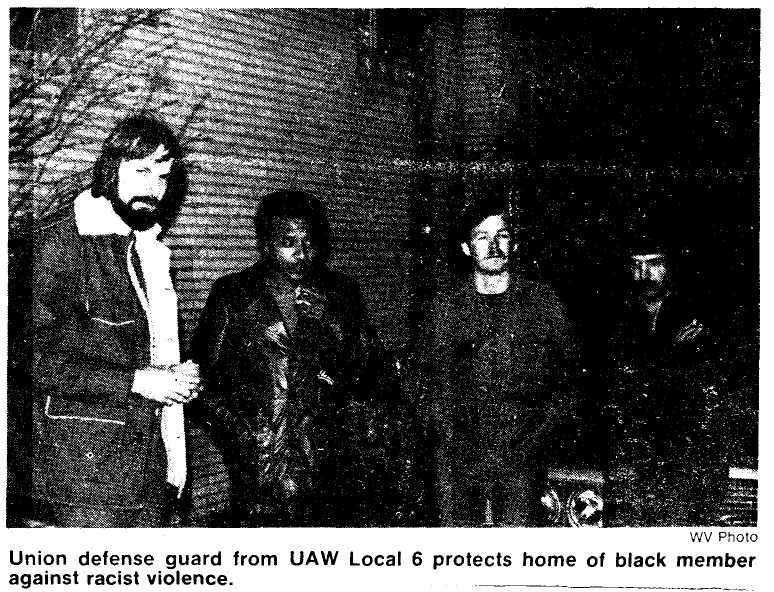
In the 1970s within the civil rights struggle debate raged on the left as to what position to take in relation to the capitalist state. The Socialist Workers Party, which at this time already was well on the rightward path which took it through reformism and onwards to irrelevance, advanced the demand for federal intervention and federal troops to defend black people. The Spartacist League defended the marxist position on the class character of the state and it's armed forces, calling instead for armed labor/black defense forces:
The black masses and their allies must rely on their own organizations and power. They must force their leaderships to take action at once and begin to organize a labor/black defense force. Only such a mobilization of the workers and oppressed can insure the implementation of the busing plan, protect black people and rout the racists. The democratic rights and lives of black people in Boston must not be entrusted to the class enemy! - Young Spartacus, December 1974, The Fight to Implement Busing, Spartacus Youth Publishing Co.
For many on the left this was seen as a utopic or ultra-left demand despite being firmly rooted in the tradition of Trotskyism and Trotsky's own writings on the subject of armed workers defense guards.
"Strike pickets are the basic nuclei of the proletarian army. This is our point of departure. In connection with every strike and street demonstration, it is imperative to propagate the necessity of creating workers’ groups for self-defense. It is necessary to write this slogan into the program of the revolutionary wing of the trade unions. It is imperative wherever possible, beginning with the youth groups, to organize groups for self-defense, to drill and acquaint them with the use of arms.
A new upsurge of the mass movement should serve not only to increase the number of these units but also to unite them according to neighborhoods, cities, regions. It is necessary to give organized expression to the valid hatred of the workers toward scabs and bands of gangsters and fascists. It is necessary to advance the slogan of a workers’ militia as the one serious guarantee for the inviolability of workers’ organizations, meetings and press." - The Transitional Program
In Chicago in April of 1975 this proposal for labor/black defense was put into practice in the defense of C.B. Dennis, a black UAW union member who was moving into a "white" neighborhood of Broadview in the suburbs of Chicago. His home had been firebombed and he became the target of threats by local Nazis. The Labor Struggle Caucus put forward and won the motion within the local Broadview union to create an integrated union defense guard to guarantee the security of C.B. Dennis and his home.
UAW members and volunteers manned the defense of C.B. Dennis's home for weeks and succeeded in scaring off attempted fascist intimidation. The action garnered widespread attention and stood as a powerful example of the role labor can play in breaking the power of white supremacists.
Lenin's invocation of the Social Democrat as the Tribune of the People is here given real material force. Lenin's vision was not of an activist organization chasing after the tails of diverse social movements but rather of the working class itself stepping forward as the advocate of the oppressed, uniting their struggles against oppression with the working class conquest of power.
The call for and implementation of labor/black defense guards connects the defense of the union, the defense of the oppressed, the arming of the working class, cements its alliances with the oppressed and provides an embryo of the dual political and military power that is foundational to any serious revolutionary challenge to the capitalist state.
Despite local success which ultimately led to it's formal adoption (if not implementation) by wider sections of the union, the political experiment was not carried more widely into the civil rights movement. The responsibility like for so many of the defeats for our class lies with reformist leaderships and of our own political or organizational failures to displace these leaderships. However the success this had on a limited scale leaves a tremendous historical lesson to be assimilated by the partisans of working class and black liberation.
The success at stopping the racist attacks wasn't just a calculation based on military force (the presence of the union militants) but also a consequence of the real power wielded by the union. An attack on C.B. or the defense guards would be an attack on the whole union, a force the fascists were rightly afraid to take on.
We have the need and the capacity to mobilize our class, to transform our economic power in the workplace and our organizational power in unions into a force which can smash white supremacists politically, economically and militarily.
This story gives us a powerful historical example of how to do just that, one which we have to learn from, absorb and reinvent for the ever present reality of racist terror; expressed both through fascist bands and the police.
The working class struggle against racism remains central to the future of our class and to cementing the real political unity of the oppressed behind a workers movement which can overthrow the putrefying edifice of racist american capitalism.
Included below are a series of articles written at the time which we have transcribed and reproduced here telling the story of how this Labor/Black defense guard was set up, implemented and the battles within the union around it.
From Workers Vanguard No. 67, 25 April 1975
Black Family Firebombed in Chicago
UAW Local Sets Up Labor/Black Defense Guard
CHICAGO, April 18 — C. B. Dennis, black UAW union member, has been trying to move into the white neighborhood of Broadview. His house was firebombed and stoned repeatedly. But tonight, like every night for the past week, the Dennis family home is being protected by an integrated defense guard of his union brothers. Local 6 of the United Auto Workers, International Harvester, voted unanimously at the membership meeting Sunday to set up the defense guard.
At a time when there is a dramatic increase in racist terror against blacks all across the country, the UAW local's action is a powerful example of what can be done to stop the nightriders. And it is the best possible answer to those who preach reliance on the bourgeois cops by hiding behind the despairing lament, "workers won't defend blacks against racist attacks – there's no solution except to call on the troops"!
The attacks, which have caused thousands of dollars' worth of damage to the house and prevented the family from moving in, are part of a pattern of terror against blacks in white areas here, where right-wingers have been trying to stir up race hatred. In another neighborhood on the Southwest Side, four black families have been forced to live under a virtual state of siege, with the National Socialist White People's Party (Nazis) all but taking direct credit for the firebombing (see article in this issue).
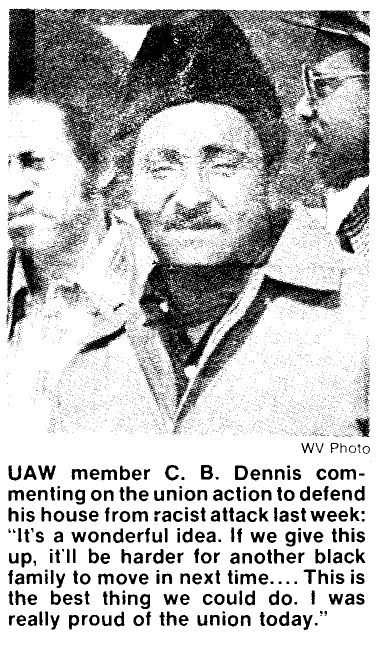
The first volunteers from Local 6, including Local president Norman Roth, were at posts outside the damaged house within hours of the union meeting. C.B. Dennis, who is a repairman at the Melrose Park 1H plant and has been working there for 15 years, was interviewed at the house by Workers Vanguard. He said he had been unable to get adequate police protection.
"They said they would come by 20 minutes out of the hour. But that's no protection at all" Dennis told WV, observing that patrols had been by only once in two hours that night. "This is the best thing we could do," he said, referring to the volunteer guards, "I was really proud of the union today. I think it's a good thing." An older black worker who was listening agreed, saying he could recall no similar action by the Local in its history. He likened it to the defense activities of the anti-eviction campaigns in which he had participated in the 1930's.
The UAW Local's defense action received considerable attention in Chicago. Articles appeared in both daily papers on Monday, and Dennis and Local 6 officers were interviewed on two television stations Monday evening. At least three radio reports were also made.
On the second night the union guards were heckled by passers-by in the area, and a neighbor two doors down shouted at them to "get the hell out" of there. Another white resident, however, had earlier come over to talk to Dennis for 20 minutes, expressing sympathy and pointing out that some of the rocks had hit his house as well.
It is clear that the racial polarization runs deep but the entire neighborhood has not been terrorized. Local 6 defense volunteers speak in terms of the need to prevent another Boston-type racist mobilization in Chicago. There have been no new attacks as the teams of Union volunteers have been guarding the house daily. Members vow the guards will remain "as long as necessary" to ensure that the family is safely moved into the house.
The attacks on black families have mounted during an organizing offensive by fascist and racist groupings in Chicago. Besides the attacks on four black families on the Southwest Side, there were earlier attacks on other families in Broadview. The Nazi Party ran candidates for alderman in five wards in the last elections, and the Ku Klux Klan has also been actively organizing lately.
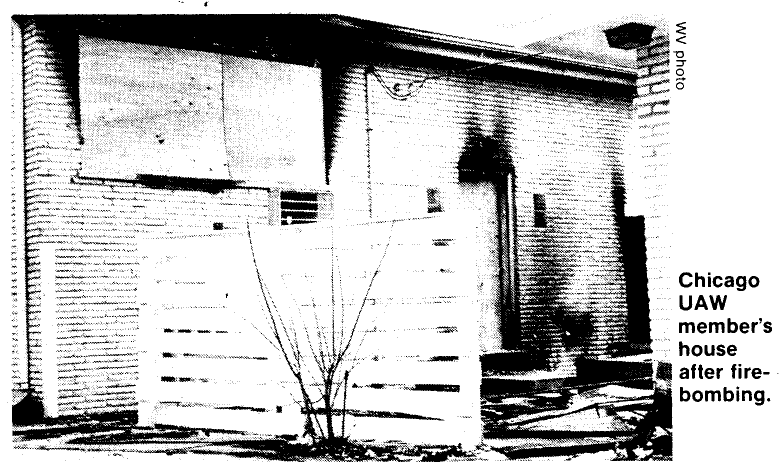
These scum thrive on the despair generated by heavy inflation and unemployment in the working class, and their efforts to divide the workers along race lines can only benefit the employers. Resolute action such as that undertaken by Local 6 could, if followed through and adopted by the rest of the labor movement, prevent future attacks and quickly lay the tiny but deadly dangerous fascist movement in the grave where it belongs.
The third attack on the Dennis house, which occurred two days prior to the union meeting, particularly incensed many members of the Local. The motion to set up the volunteer union defense guards was made by a member of the Labor Struggle Caucus, which had distributed a newsletter in the plant before the meeting calling for a militant response to the wave of racist terror. The Labor Struggle Caucus is a grouping in Local 6 with a class-struggle program which has recently been active in successful struggles against a company leafleting ban in the plant and against a move to extend terms for local union officers to three years. Its resolution at the Sunday meeting supported the "struggle for integration of blacks in housing, education, and jobs," as "vital interests of the entire working class," and denounced reliance on the police, who "serve the employers and cannot be depended upon to defend the rights of blacks or of the trade unions." The motion also called for defense activities to be extended to the black families on the Southwest Side, as well as Broadview.
Following the meeting, the Local issued a special number of its newsletter. Although this was reportedly not very well distributed, a special meeting held Tuesday night for volunteers was at-tended by 25 members from all political groupings in the Local, as well as by a television crew, which filmed the entire proceedings. President Roth chaired and took a lot of criticism for the inefficient distribution of the special Local newsletter which, it was said, kept the meeting from being larger.
He also relented under pressure on his earlier objection to the formation of a special committee to organize the defense guards. A steering committee was then set up under the chairmanship of the by-laws committee chairman. It includes two members of the Labor Struggle Caucus, a member of the syndicalist Workers Voice group, and other Local members. Members of the steering committee immediately began signing up volunteers in the plant.
Support for the defense activity was forthcoming, at least verbally, from the UAW officialdom in the area, including regional director Robert Johnston. The special Local newsletter asserted, "These efforts are in accord with our UAW principles and policies."
On the other hand the UAW officials seemed primarily concerned to get government officials to intervene, thereby relieving the union of its responsibility. At the Dennis house on Sunday night, Roth told WV of his intention "to exert every political pressure possible to try to get the authorities to do something." He further claimed that "In some instances the police have given some protection."
Roth, who is a prominent supporter of Trade Unionists for Action and Democracy, the trade-union group backed by the reformist Communist Party, not surprisingly places confidence in the bosses' state. Yet neither courts, cops, troops nor National Guard will protect blacks against racist victimization. This can be clearly seen in the Boston situation, where the courts are conciliating the racists, and have taken a giant step backward on the busing plan.
In Boston there have been two sharply counterposed lines on how to defend the endangered blacks from racist attack. On the one hand there are the liberals, joined by the Communist Party and Socialist Workers Party, who have called for federal tr00ps. Against this dead-end reliance on the armed forces of the capitalist state, the Spartacist League has called for integrated working-class defense. Both in Chicago and Boston or elsewhere, labor/black defense guards could quickly eliminate racist terrorists, neutralize wavering elements in the white population and eventually defuse racist mobilizations.
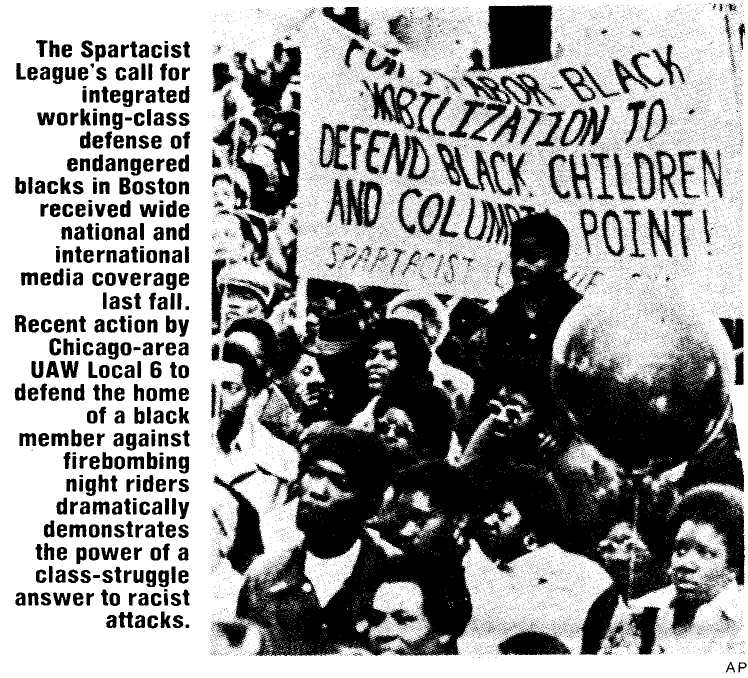
The Local 6 action could be the start of a general initiation of militant class-struggle response to racist terror in the Chicago area, but only if the whole Local, leadership included, works to undertake it seriously and spread the idea to other locals. If the Local 6 leadership instead spreads illusions in the state, the way will be left open for a worsening racial polarization. The guard must not be ended prematurely, on the advice or promise of the cops or city officials that defense will be provided by the state.
The recent action of the Local 6 members stands as an inspiring example for all trade unionists and black militants: black and white workers can unite and organize to fend off racist terror. It will take an all-sided fight for class-struggle policies and leadership throughout the labor movement to turn this example into the rule. But an important beginning has been made.
From Workers Vanguard No. 68, 9 May 1975
Build the UAW Labor/Black Defense Guard in Chicago!
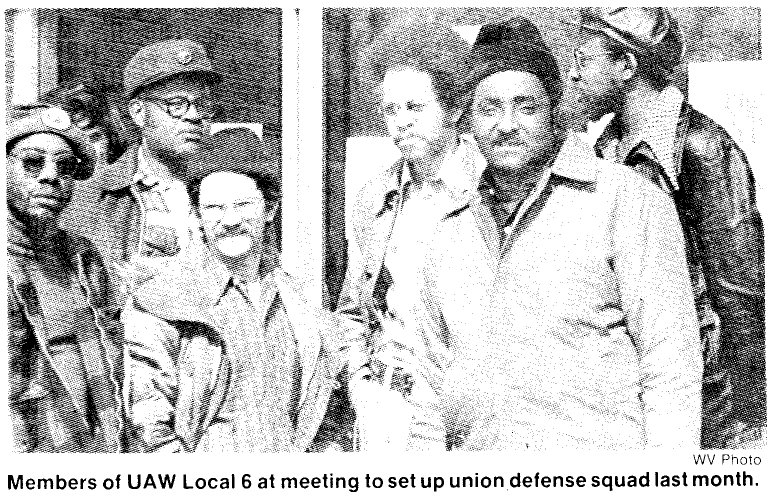
CHICAGO. May 2 — A squad from the Civil Rights Defense Committee of UAW Local 6 continues to stand guard nightly at the house of black union member C.B. Dennis. The Dennis home had been fire-bombed and repeatedly stoned by night-riding racists trying to prevent the family from moving into the all-white suburb of Broadview. But ever since the union guards began patrolling three weeks ago. there have been no further attacks on the house.
The defense committee was set up by unanimous vote at the monthly meeting of Local 6 (International Harvester, Melrose Park) on April 13. Since then a steering committee has been actiyely signing up volunteers for the defense squad and contacting other union locals and black organizations, including the NAACP and PUSH. Already individuals from UAW Local 59 (Stanadyne). Local 688 (Broadview Parts Depot) and Local 719 (GM Electromotive) have taken part in the guard.
In addition, an official of Amalgamated Meatcutter Local 500 has offered the active support of his local and several members of the West Side Coalition, a black community organization in Chicago, have been involved in the defense. According to steering committee member Marc Freedman, the guards will remain at the Dennis home as long as they are needed to prevent the attacks. (Freedman, who introduced the motion setting up the defense committee, is a member of the Labor Struggle Caucus, a class-struggle grouping at Harvester.)
As we reported in the last issue of WV, these attacks are part of a pattern of terror against blacks living in predominantly white areas of Chicago, a campaign to which Nazis and the KKK have been linked. At a time when these gutter demagogues are finding a growing audience for their race hate filth and treacherous reformists preach reliance on thc armed forces of the capitalist state as the answer Broadview represents a call for action by the labor movement. The UAW militants' response is the answer to racist mobilizations such as in Boston!
Because the militant defense of the Dennis home by Local 6 stands in such striking contrast to the usual inaction of the labor movement in the face of racist attacks, it received considerable attention from the local news media. It has also led to harassment by the cops, company and fascists.
• Broadview police, who earlier refused Dennis' request for full-time protection against the attacks, are now busy checking out the license plates of members of the defense guard, allegedly looking for "unauthorized individuals."
• At the International Harvester Parts Depot in Broadview, the company fired two workers for distributing copies of Workers Voice (a syndicalist newsletter) calling for support to the defense committee. The two militants were only reinstated after they filed a suit with the NLRB against this blatantly illegal victimization.
• Workers arriying at the union hall last week found the words "'N----r Beware" scrawled on the front door. The fascist preachers of race hate aim at the total destruction of the organized labor movement and Local members are becoming increasingly aware that defense of the Dennis home is also defense of the union.
The major stumbling block to a wider mobilization for defense until now has been inaction on the part of the union leadcrship. Despite the clear mandate of the membership, it is reported that Local 6 president Norm Roth has not contacted other union locals about the defense. Furthermore the Local executive hoard has so far refused to recognize the Civil Rights Defense Committce as an official union body, overriding the unanimous request of the steering committee.
Conservative elements in the Local leadership together with the reformist Roth (a leader 0f the Communist Party backed Trade Unionists for Action and Democracy) are attempting to funnel widespread sentiment to defend the Dennis home into reliance on the capitalist state. But as Freedman (who is running for executive board member-at-large as candidate of the Labor Struggle Caucus) points out, labor black defense is counterposed to reliance on the cops, who do not protect working people but their enemies the corporations, banks and fascist scum.
Only by strengthening and extending the Local 6 defense guard, winning support from other union locals and black organizations, can the nightriders be stopped. And only by linking this exemplary labor black defense to a full program for independent working-class action such as put forward by the LSC for factory occupations against mass layoffs, for a workers party based on the unions, for a workers government can it become part of a class-struggle offensive which will put a stop to racist terror by overthrowing the capitalist system which breeds it.
From Workers Vanguard No. 69, 23 May 1975
Labor/Black Defense Continues in Chicago
Class-Struggle Candidate Polls 17% at Harvester
Woodcock Forces Sweep Local 6 Elections
CHICAGO — Recent elections in UAW Local 6, at International Harvester's important Melrose Park plant on Chicago's West Side, produced a sweep for the right-wing business-unionist pro-Woodcock slate. The results were a stern indictment of the reformists who hide their politics in unprincipled coalitions and disguise their opportunism with phony "militant" phraseology. But they also showed strong support for the one candidate who actively built the Local's ongoing labor black defense guard as a main focus of his campaign.
A month ago the Local voted unanimously for a resolution presented by the Labor Struggle Caucus resulting in the formation of a defense guard to protect a black member's house, which had been repeatedly attacked (including fire-bombing) in an attempt to prevent him from moving into the predominantly white neighborhood of Broadview. These attacks were part of a wave of terror against blacks in white areas of Chicago; on the Southwest Side, Nazis have all but taken direct responsibility for similar incidents.
Despite foot-dragging by the Local 6 leadership and silence from most of the candidates in the recent election, the defense guard continues to operate and has thwarted new attacks on the house. Support for the defense has reportedly been received from UAW Local 688 (Broadview Parts Depot), Boilermakers Local 1257 and the Bulk Mail Center local of the Postal Workers Union. Resolutions of support have been raised in at least three other local unions, including Steelworkers Local 65, at U.S. Steel's Southworks.
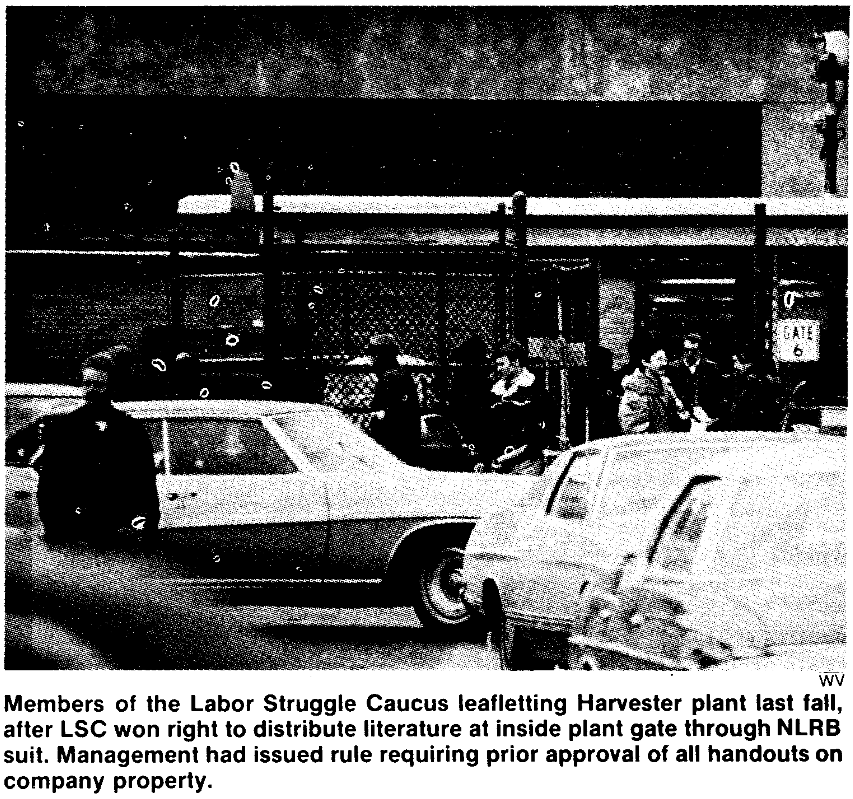
Red-Baiters Denounce "Dream Schemes"
The across-the-board winners in the election were the candidates of the Positive Action Leadership (PAL) slate, consisting of the incumbent administration under retiring shop chairman Robert Stack. The PAL launched a no-holds-barred red-baiting attack on its main opponents grouped together in the Rank and File Coalition (RFC). Echoing a classic J. Edgar Hoover line, Stack wrote in his regular Local newsletter column inveighing against "anarchistic, revolutionary elements" who "used and exploited the plight of minority members of the union" (Union Voice. 25 April). The opposition, said PAL, was a "catch-all coalition of militant visionaries" who would "present their 'dream-schemes' for world revolution to the Company as your views." PAL, in contrast, promised "responsible" unionism with "a team of experienced leaders."
The opposition, which included Local 6 President Norm Roth running a losing battle for shop chairman, was indeed a catch-all coalition, but that was the only accurate point in Stack's diatribe. The RFC grab-bag was no more capable of presenting a program for "world revolution" than PAL, but the few so-called "revolutionaries" within it opened themselves up to vicious red-baiting with their own well-practiced and incurable opportunism.
Roth, who has a long-standing individual following in the plant, is a leading member of Trade Unionists for Action and Democracy and helped found the short-lived Auto Workers Action Caucus (AWAC), both of which are supported in the press of the reformist Communist Party. AWAC was touted by the CP as the answer to the United National Caucus (UNC), which it considered too oppositional. CP-supported elements, including Roth, backed Woodcock for UAW president at the union's last convention.
The RFC also included left social-democratic elements and received the support of the International Socialists. The IS, however, is a chief backer of the UNC — despite the latter's support for protectionism and its attempts to exclude socialists at UNC demonstrations — and criticizes the CP's support for Woodcock. Thus about all the RFC could agree on was a low-level program of shop-floor militancy. At a time when massive layoffs and racist violence are the main issues facing the membership, the RFC concentrated its campaign fire on speed-ups. While mentioning six hours' work for eight hours' pay in its program, the RFC also endorsed the current sellout contract whose bankruptcy in the face of layoffs is demonstrated by the collapse of GM and Chrysler SUB funds.
No effective answer to PAL's sophisticated red-baiting could possibly be mounted by a group so divided on fundamentals that one half of it praises "detente" as the answer to unemployment (the plant happens to be operating largely on Soviet tractor orders) while the other half capitulates to anti-communist "Buy Americanism"! Since the RFC offered nothing beyond a slightly frenzied version of the same business unionism as PAL (one plank in the RFC program was a vague call for "total non-cooperation" as the answer to speed-up), the membership, logically enough, opted for the "experts."
Defense Guard Must Be Strengthened
Meanwhile, the Labor Struggle Caucus, a group of Local 6 militants putting forward a class-struggle program, reduced its number of candidates from three (in the 1974 elections) to one this year, largely because of the LSC's heavy involvement in building the Local defense guard. Its candidate for executive board member-at-Iarge was Marc Freedman, who is also secretary of the Civil Rights Defense Committee.
A recent incident at the Dennis house drove home the need for the entire Local to strengthen this defense committee, a point which the LSC has been making for some time. Last week five whites drove up to the home, yelling racial epithets and making threatening moves toward a car in which two unionists on duty at the time were sitting. No violence resulted, but the failure of the union leadership to mobilize for the guard has heightened the danger of renewed racist violence.
One of the two campaign leaflets issued by the Labor Struggle Caucus attacked the other candidates for ignoring the guard and ran a "box score" showing who had served guard duty and who hadn't. In a capitulation to racism in the plant, the entire PAL slate had not served once. While Roth and a few candidates for lesser office on the RFC slate had helped guard the house, these "militants'" remained silent about the defense squad in all their campaign literature.
In addition to supporting labor black defense as part of a militant, integrationist program to fight racism with united working-class action, the LSC was alone in proposing an effective response to the layoffs (of 200 to 250 workers) which were announced for the plant just prior to the election. On this key question, which is plaguing the auto union and the entire working class, Roth proposed "detente" and paid lip-service to the old UA W slogan of a shorter workweek at no loss in pay. The Labor Struggle Caucus made the issue quite concrete by proposing a resolution for a strike to stop the layoffs, "extended throughout the Harvester chain and backed up with the full power of the International union."
The LSC also rejects class collaborationism and called for opposition to the parties of big business (Democratic and Republican), and for the building of a workers party which would "fight for a workers government to reorganize our society to do away with unemployment and racism."
Unable to mount a serious challenge to the main slates with only one candidate, the LSC nevertheless scored a victory for the labor black defense effort and its class-struggle program by winning 441 votes, or 17 percent of those voting, for its candidate. This is more than double the highest vote received by a candidate of the Militant Action Slate (which subsequently became the LSC) a year ago. The program and determined struggle of the LSC point the way forward to victory for a class-struggle leadership of the workers movement in the future.
From Workers Vanguard No.71, 20 June 1975
UNC Backs Busing, Union Defense Guards
DETROIT, June 9 — A one-day United National Caucus (UNC) conference on "The Crisis in the Auto Industry" ended here yesterday in a ragged division, replete with screaming personal invective, over the question of organizing defense guards based on trade-union, black and community groups to protect against racist assaults on school busing. (Court-ordered integration is expected to be a major issue in Detroit when schools reopen in the fail.) The "sense" of a motion for labor/black defense was adopted, but referred to the UNC's executive board for implementation. The question, which led to hours of acrimonious debate, was considered only as the meeting was about to end and due to the insistence of a non-member who considers the group too opportunist to join.
The United National Caucus originated in the skilled trades' rebellion in 1968 and is the anti-Woodcock opposition of a handful of lower-level United Auto Workers (UAW) officials who for various reasons oppose the union's International regime. The group has a formal program calling for nationalization of the industry, "30 for 40" and a labor party. However, UNC leaders such as Jordan Sims (president of Local 961), Edie Fox (Local 3), Pete Kelley (Local 160) and Al Gardner (just defeated in a bid for re-election as president of the Tool and Die Unit of Local 600, one of the group's original bases) invariably drop the paper program when they are running for office.
The UNC also contains a more radical faction of members in various locals around Detroit, which receives the backing of the left social-democratic International Socialists (IS). The UNC as a whole receives ever-so-slightly critical endorsement from Workers' Power, the IS newspaper. At yesterday's meeting it was these radicals, by and large, who voted for the motion which their bureaucratic friends considered an anathema to their careerist appetites.
The conference had earlier run into differences over another question concerning racial oppression and the unions: seniority vs. "super-seniority" for blacks, other minorities and women. "Super-seniority," or preferential layoffs, an attack on the unions' only existing form of job protection (seniority), is currently being pushed by various left groups such as the IS and the Maoist October League (OL). In effect calling for taking jobs away from older white male workers, this divisive scheme is a substitute for a united class-struggle fight against layoffs.
The trade-union bureaucracy, which unquestioningly accepts the companies' "right" to layoff thousands of workers in order to protect profits, opposes "super-seniority" in order to defend the status quo of special oppression of minorities and women, traditionally the "last hired and first fired." IS-supported elements, who have been doggedly seeking to keep the UNC amalgam of bureaucrats and radicals taped together despite numerous differences, would not have raised the issue at all, but a Maoist brought it up in a veiled form: a motion to defend the right of women and minorities to stay in the plants.
A member of the UNC correctly saw this as, in effect, a call for preferential layoffs, and objected strenuously. Though the group's leaders indicated they had been discussing the question for six months, they argued that it should be tabled to the executive board because of "complexities of the issue." What is "complex" is not the issue, but rather finding a palatable compromise satisfying both major factions of this unholy alliance.
Edie Fox led the attack for the bureaucratic compromisers, which resulted in tabling the motion; some of the IS-backed radicals drifted to her support. This embarrassed the other side in front of several new black UNC members present at the conference, who had been misled into supporting "super-seniority", as a program against racism. The radicals' acute embarrassment over this issue contributed to the near-split later, as they sought to redeem the UNC in the eyes of these blacks.
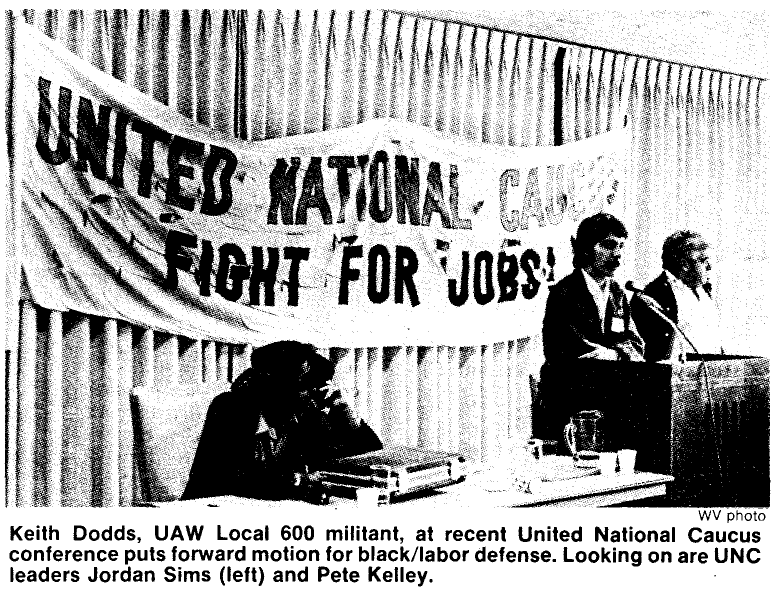
Even more important, however, was the issue of the reactionary anti-busing mobilization in Boston and spreading activities of small but vicious fascist-inspired groups around the country which have made the need for working-class defense against racist attacks impossible to ignore. The capitalist government protects the racists and seeks to keep the working class divided — it is incapable of implementing integration or defending black people. An effective answer has, however, been provided by UAW Local 6, at an International Harvester plant outside Chicago, which set up a union defense guard to protect a black member's house that had been fire-bombed by racists.
The motion for labor/black defense in Local 6 was put forward by a class-struggle opposition group, the Labor Struggle Caucus (see WV No. 67, 25 April). However, a number of opportunist radical groups have tried to falsely take credit for the Local 6 action and cover up the action (or inaction) of their own supporters. The IS' Workers' Power (24 April-7 May) reprinted the entire LSC motion without indicating who put it forward. The June issue of the OL's Call blatantly lied, claiming that the Chicago Workers Solidarity Committee organized the defense guard and got the motion passed. Actually, this group has no supporters in the plant, had nothing to do with the resolution and has refused to deal with the Local committee in charge of the defense guard.
Consequently, when a motion for labor/black defense was raised at the end of yesterday's conference, Jack Weinberg, leader of the IS-backed wing and its representative on the UNC executive board, found it impossible to let the motion die for lack of support from a UNC member. To do so would have been too compromising even for these professional social-democratic compromisers.
It was not one of the UNC "radicals" who introduced the motion but Keith Dodds of the Dearborn Assembly Unit of Ford Local 600. Dodds was recently a candidate in Local elections, where he ran for unit president on a class-struggle program including support to busing and labor/black defense. Like the Labor Struggle Caucus of Local 6, which had an observer at the conference and presented a motion condemning the "Buy American" protectionism to which the UNC capitulates, Dodds is not a member of the UNC because, he says, it is "an unprinci-pled swamp" whose main aim is to put a new clique of bureaucrats in office.
Since the UNC executive board, to which the motion was referred, is dominated by the bureaucratic elements who tried to duck the issue, Workers Vanguard may be the only paper to print the motion for which the auto workers' group has nominally gone on record:
"Whereas the racist right wing forces have made the anti-busing campaign their focal point seeking to drive back even the limited gains of black people, and
"Whereas working class unity can be achieved only by the most militant defense of minorities' rights to equality in jobs, housing and education which can only be achieved by labor struggle for integration, and
"Whereas busing represents at least a minimal step towards integration of the schools, and
"Whereas the anti-working-class forces of repression — police, national guard, and federal troops — cannot be relied on to protect black people against vicious racist attacks,
"Therefore be it resolved that this meeting of the UNC commits itself to a broad united front mobilization for: 1) defense of busing; 2) extension of busing to the relatively more privileged and largely white suburban schools; 3) a fight to make the UAW take leadership and responsibility for the formation of city-wide defense guards based on the UAW, other labor unions, black and community organizations to ward off and defeat racist violence against blacks and all school children."
Weinberg insisted that this motion be discussed and voted upon, although it could have been "safely" ignored. This sent the bureaucratic leaders into a frenzy, using every kind of underhanded argument and baiting against their radical "allies." Sims, who is black, race-baited Weinberg by claiming he was sick of guilty white liberals who "stick their noses halfway into our business." Calling Dodds a hypocrite for proposing a motion to a group he disagreed with, Sims castigated Weinberg for backing the motion of "that Johnny-come-lately from Ford's." "You make me sick, Jack," he raged at Weinberg, "You make me sick.".
Fox, Sims and Kelley sought to prevent the motion from passing primarily by accusing Weinberg and his supporters of hypocrisy rather than by outright opposition. But it was the substance they objected to. A serious mobilization by the UNC to promote UA W-organized labor/black defense would endanger their bureaucratic positions, leading to an all-out battle with the gang in Solidarity House which the UNC is neither willing nor able to fight. The radical faction, on the other hand, is increasingly feeling pressure because the rightward drift of the UNC leadership is becoming more pronounced while the group's popularity stagnates or dwindles.
With such fundamental issues as seniority/preferential layoffs and labor/black defense wrenching apart the already tattered UNC coalition, official proposals coming from yesterday's conference, notably a campaign for a special UAW convention to combat unemployment, are doomed to limited life-expectancy. It remains to be seen if the fractured and squabbling UNC will use its position as the largest UAW opposition group in Detroit to implement the labor/black defense resolution it has so tenuously adopted.
